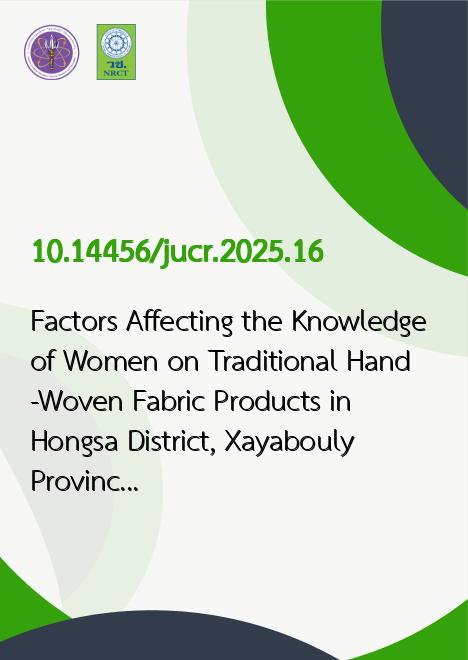
|
Factors Affecting the Knowledge of Women on Traditional Hand-Woven Fabric Products in Hongsa District, Xayabouly Province, Laos |
|---|---|
| รหัสดีโอไอ | |
| Creator | Chanthakhoun, Kitsana |
| Title | Factors Affecting the Knowledge of Women on Traditional Hand-Woven Fabric Products in Hongsa District, Xayabouly Province, Laos |
| Contributor | Phomlasaboud, Khanthavanh, Chanthakhoun, Vongpasith, Kruekum, Phutthisun, Rungkawat, Nakarate & Fongmul, Saisakul |
| Publisher | Faculty of Fine and Applied Arts Chulalongkorn University |
| Publication Year | 2568 |
| Journal Title | Journal of Urban Culture Research |
| Journal Vol. | 30 |
| Page no. | 260-268 |
| Keyword | Womens knowledge, Traditional Hand-Woven Products, Laos |
| URL Website | www.cujucr.com |
| Website title | Journal of Urban Culture Research |
| ISSN | 2408-1213 |
| Abstract | This study aimed to investigate the knowledge of traditional hand-woven products and the factors influencing this knowledge among 184 farmers in Hongsa District, Sayabouly Province, Laos. Data were collected through questionnaires and knowledge tests and analyzed using descriptive statistics and multiple regression analysis. The results showed that over 62.5% of the participantsmost of whom were womenhad a moderate level of knowledge about traditional hand-woven products. Several factors had a statistically significant positive relationship with knowledge (p < 0.05), including income earned from weaving, frequency of contact with neighbors, education level, and time spent on weaving activities. Conversely, age was found to have a significant negative effect on knowledge levels. These findings suggest that younger, better-educated individuals who are more socially connected and spend more time weaving tend to have higher levels of knowledge. Therefore, interventions aiming to sustain and conserve traditional hand-weaving practices should focus on strengthening knowledge-sharing among community members, improving access to education, and offering targeted training programs. Such efforts could enhance local income opportunities and support the long-term preservation of traditional cultural practices. |